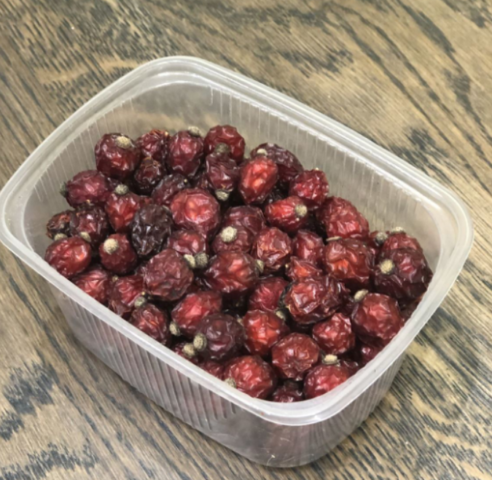Content
Rose hips are extremely useful - this is recognized not only by folk medicine, but also by official medicine. However, vitamins, macro- and microelements are lost almost completely if rose hips are stored incorrectly or used after the expiration date. There are some nuances in the preparation and selection of quality fruits, which also need to be taken into account.
How long does rosehip last?
The shelf life of fresh fruits is minimal - they will last 4-7 days in the refrigerator. Then it begins to dry out or rot. In the freezer, whole, peeled or pureed berries do not lose their beneficial properties for up to 12 months, but it is better to consume them within six months after freezing.

It will not be possible to preserve fresh fruits for a long time, regardless of the conditions created for it.
How long can dried rose hips be stored?
Heat treatment provides dry rose hips with a maximum shelf life in optimal or close to optimal conditions - up to two years.However, under the influence of light and oxygen, vitamin C is gradually destroyed, so the berries will bring maximum benefit if consumed within a year after being “stored.”

During the drying process, the berries do not lose their presentable appearance
Which fruits are suitable for storage?
Only completely mature, but not overripe, rose hips are suitable for storage. It must be collected in August-October, always before the first frost. “Conditional” specimens have a uniform orange, coral or bright scarlet color (depending on the variety), they retain sufficient hardness and density, and no dents remain on the skin when pressed.

Ripe berries acquire a light sweet and sour aroma
For storage, rose hips must be cut along with the sepals in order to preserve the beneficial substances to the maximum. Preparation should begin within 3-4 days.

To avoid deformation, the collected berries are placed in flat, wide containers
Rose hips intended for long-term storage must be sorted, getting rid of plant debris and all spoiled berries even before drying or freezing. The “rejected” fruits are washed and completely dried.

You should not leave “substandard” berries for long-term storage; they will definitely not bring any health benefits.
How to properly store rose hips at home
Storage conditions for dried and frozen rose hips are significantly different. Constancy of the microclimate is extremely important; sudden changes in temperature and humidity negatively affect the benefits of the fruit.
How to store fresh rose hips at home
Before processing, the harvest is stored in the refrigerator, placed in any hermetically sealed containers, otherwise they will absorb extraneous odors from other products. The only way to keep it fresh for a long time is to freeze it. To save space in the freezer, you can remove seeds and hard “hairs” from the fruit in advance, cutting them in half, or even pass the remaining “halves” through a meat grinder and grind them in a blender.

Whole rose hips take up much more space than pureed ones.
Fruits subjected to “quick”, “shock” or “super” freezing are best suited for long-term storage. In this case, the exposure time to low temperatures is minimal (about five minutes), the beneficial substances are almost not destroyed. In standard mode it increases to 2-3 hours.
After freezing, the harvest for long-term storage is packaged in small portions in hermetically sealed plastic containers or tight bags with zippers. To ensure that foreign odors are not absorbed, you can additionally wrap them in foil or cling film.

To store frozen rose hips, you need a constant temperature within -18-24 °C
How to store dried rose hips at home
The optimal conditions for storing rose hips do not change depending on the method of drying them. To do this, you can use an oven, electric dryer, microwave, convection oven, or simply leave the fruits in the open air. But it is necessary to take into account: if the berries are exposed to direct sunlight or during heat treatment the temperature rises above 60 ° C, this greatly reduces the concentration of vitamin C.
For long-term storage, the harvest is packaged in linen (made from natural fabrics), paper or gauze bags, small cardboard boxes or wooden boxes, and ceramic pots. Containers made of glass or plastic are also suitable, but not airtight. So that the fruits can “breathe,” several holes are made in the lid, or it is replaced with gauze folded in 3-4 layers, secured with an elastic band or lace at the neck.

Linen bags combine breathability with the ability to save space when storing dried rose hips
Containers with dried fruits must be placed in a dark place, protected from direct sunlight, which is detrimental to vitamin C. Also, optimal storage conditions include low (about 50%) air humidity, which reduces the risk of developing fungal diseases, good ventilation and coolness (12-12 20 °C).

Airtight plastic bags are absolutely not suitable for storing rose hips.
For dried rose hips, “neighborhood” with any spices, herbs, herbs, or food products that have a pronounced odor is excluded. It quickly absorbs “foreign” aromas, losing its own. Also undesirable “companions” are fresh fruits and vegetables, which release water vapor and heat during the “breathing” process.
What is the best way to store rose hips?
Both dried and frozen fruits will provide health benefits. In the first case, dry rose hips can be stored longer, but during the heat treatment process, approximately 30-40% of the vitamins, macro- and microelements contained in the fruit are lost. After freezing, up to 90% of the nutrients are retained.
Accordingly, the storage method is chosen to ensure optimal or close to optimal conditions for the berries. More often, preference is given to drying, because the volume of the freezer is limited. Finding a dry, cool, dark place is much easier.

Both frozen and dried fruits are equally suitable for preparing tinctures, decoctions, and infusions.
Conclusion
You need to store rose hips correctly, in compliance with certain conditions, by correctly selecting and preparing the fruits - only in this case their beneficial properties are not lost. It should be taken into account that their “shelf life” in any form is not infinite - vitamins, macro- and microelements are gradually destroyed under the influence of light and oxygen.








